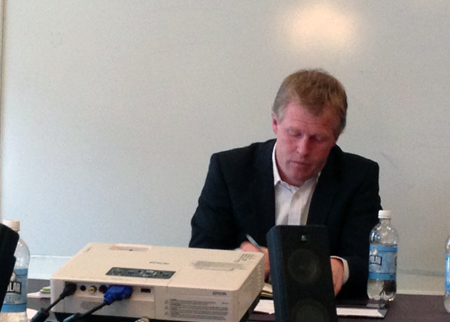Event Highlights: Federalism by Exception – The Future of Economic Governance in the Euro Area with Henrik Enderlein
On Wednesday, April 24, the Center for the Study of Europe hosted Henrik Enderlein, Professor of Political Economy at the Hertie School of Governance and Pierre Keller Visiting Professor at Harvard University, for its final luncheon discussion of the semester. In his presentation, entitled “Federalism by Exception: The Future of Economic Governance in the Euro-area,” Enderlein took up the question of how to make a currency union work in the absence of political union. This is not, Enderlein suggested, merely a technical question – there are broader issues, issues pertaining to democracy, at stake. The Euro Area represents an attempt to organize a transnational economy in the absence of a nation state. No easy task, as the crisis reveals!
When thinking about transnational economic order, Enderlein said, where optimal currency conditions are not fulfilled – in the Euro Area, for example, you are faced with a “trilemma” insofar as you can combine only two of three policy goals:
- National economic policies
- Avoidance of moral hazard
- Crisis prevention
According to Enderlein, the Maastricht framework combined national economic-policy making with avoidance of moral hazard in a straightforward way: no bailouts, no hazards. The underlying logic, he said, was “keep your house in order.” But the system could not deliver on the third policy objective – crisis prevention – on the contrary, it has resulted in massive economic imbalances.
Since the crisis, Enderlein said, policy-makers have been searching for various ways to introduce crisis prevention into the current system. But the first approach – some sort of transfer union – raises fears of moral hazard, especially among Germans, while the second – full hierarchical fiscal federation – would result in the transfer of sovereignty to the European level.
The trilemma, Enderlein said, maps the debate in the euro area. Pondering the three contradictory regimes, he raised the question whether we could design something that might work, given the suboptimal context, namely, a heterogeneous currency area. Since the criteria for a single currency union are not fulfilled, he said, there should be other safeguards in place. What might a system of governance in the euro area look like? Enderlein proceeded to answer this question – the subject of his talk – by turning to the root causes of the crisis, in order to understand what went wrong and how to fix it.
The first “root cause” of the crisis, Enderlein said, was “instability.” He blamed the ECB’s “one size fits none” policies for the bifurcation between the eurozone core and periphery. Rather than stabilizing the economies of northern and southern Europe, he argued, ECB policies drove the two blocs apart. The destabilizing effects were reinforced by financial markets and without the institutional frameworks in place to offset matters, some countries built up surplus positions while others grew deficits. He suggested that short of fiscal federalism, which is inconceivable in the next decades, the solution to the instability problem is to integrate trade in order to allow regions to become more similar in terms of production and process. Regional buffers, he said, would provide a kind of “cyclical stabilization,” which is one element of “federalism by exception.”
The second cause, which Enderlein identified as “self-fulfilling fiscal crisis,” is connected to the question of state liquidity and solvency. As Enderlein explained it, without the tool of currency devaluation or the ability to print money, if a country in a monetary union gets into a situation in which it is illiquid and cannot finance its debt in the market, the next move on part of creditors is to give a loan or buy bonds. When investors question a country’s ability to fulfill its debt obligations, they will demand higher interest rates. Rising interest rates make it more difficult for the country to fulfill its debt obligations. This, Enderlein said, is the “self-fulfilling crisis” described by Paul Krugman, in which “fear of default is precisely what leads to default.”
As the risk of insolvency spread, the euro area was quick to understand that it had to breach the Maastricht Treaty’s “no bailout” clause and provided bailouts to Greece, to Ireland, and to Portugal. The result, Enderlein said, has been an “imbalanced transfer union,” wherein the EU’s negotiating position is relatively weak. Introducing the second element of “federalism by exception,” he spoke of the need for a system whereby countries in normal times retain control of their fiscal policies; only when they are in trouble is there a step-wise transfer of sovereignty.
The third cause of the crisis, Enderlein said, was the “nexus between banks and sovereigns.” Because the banking system in Europe is largely national, he said, risk is not allocated effectively. Banks buy the debts of *their* governments, who in turn guarantee the debt of *their* banks. Enderlein proposed a single resolution authority at the European level along with common deposit insurance.
Concluding, Enderlein said that there can only be such transfers of sovereignty if there is sufficient democratic control. The euro area, he argued, was based on “output legitimacy,” that is, it derived its legitimacy from the results it obtains – there is no “input legitimacy” at the European level. Achieving democratic legitimacy at the European level means answering the question of what kind of European Union do we want? Here Enderlein stressed the importance of thinking innovatively, getting rid of the idea that “when you have a finance ministry you also have to have a common soccer team.”
Links:

